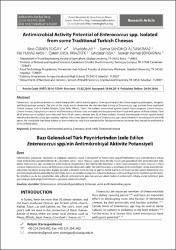Antimicrobial activity potential of enterococcus spp. isolated from some traditional Turkish cheeses

View/
Access
info:eu-repo/semantics/openAccessDate
2016Author
Özmen Toğay, SineAy, Mustafa
Sandıkçı Altunatmaz, Sema
Yılmaz Aksu, Filiz
Erol Tınaztepe, Özlem
İssa, Ghassan
Büyükünal, Serkan Kemal
Metadata
Show full item recordCitation
Özmen Toğay, S., Ay, M., Sandıkçı Altunatmaz, S., Yılmaz Aksu, F., Erol Tınaztepe, Ö., İssa, G, Büyükünal, S. K. (2016). Antimicrobial activity potential of enterococcus spp. isolated from some traditional Turkish cheeses. Perspectives: Studies in Translatology. 24.2, 319-338.Abstract
Enterococci can produce enterocins which have antimicrobial activity against Gram-positive and also Gram-negative pathogenic, toxigenic and food-spoilage bacteria. The aim of this study was to determine the antimicrobial activity of Enterococcus spp. isolated from traditional Turkish cheeses such as Kashar, Manyas, Sepet, Kelle, Mihalic, Tulum. The isolates were tested against Listeria monocytogenes, Listeria innocua, Listeria ivanovii, Staphylococcus aureus and Enterococcus faecalis and also detected the presence of entA and entB genes of these isolates. Total 66 of enterococcal isolates were obtained from 34 of cheese samples and 25 of these isolates showed antimicrobial activity against tested reference bacteria by using agar spotting method. Also it was determined most of Enterococcus spp. carried enterocin encoding entA and entB genes. We concluded that these isolates or their enterocins may have a potential for food preservation, however they should be evaluated in terms of food safety.

















